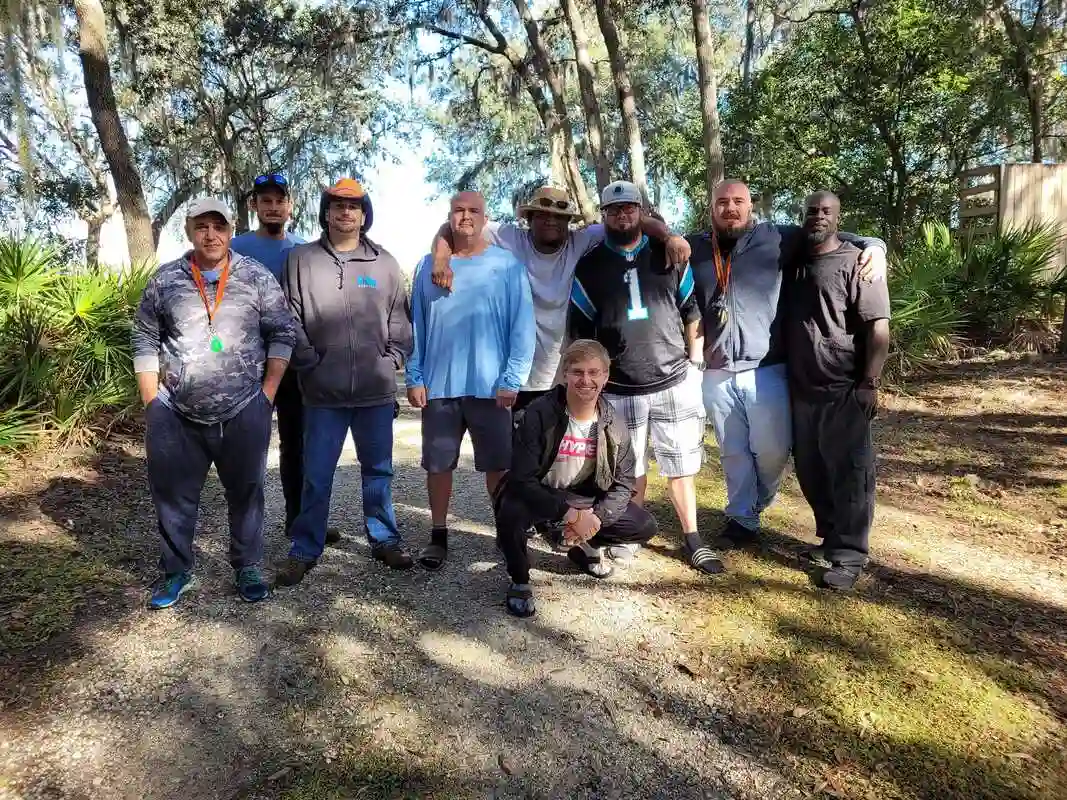Discover the transformative power of men’s recovery communities in overcoming addiction and rebuilding lives. This article explores the unique aspects of these communities, emphasizing their effectiveness in fostering personal growth and long-term recovery.
By addressing the barriers men face when seeking help for addiction and the specific challenges they encounter during recovery, we gain a deeper understanding of the importance of tailored support systems.
Through counseling, therapy, and peer support, men can address underlying issues, develop coping mechanisms, and acquire essential life skills that empower them to lead healthier, more fulfilling lives.
This article aims to inspire individuals struggling with addiction to seek the support they need and provides valuable insights for professionals in the field of addiction recovery.
Key Takeaways
- Men’s recovery communities provide a safe and structured environment for individuals to overcome addiction.
- These communities understand the unique challenges men face in their recovery process, such as societal expectations and cultural norms.
- Tailored support systems foster a sense of belonging and combat feelings of isolation and shame.
- Therapeutic interventions offered in these communities, such as counseling and group therapy, equip individuals with tools for long-term sobriety.
The Importance of Men’s Recovery Communities
Men’s recovery communities play a crucial role in supporting individuals on their journey towards sobriety by providing a safe and structured environment where men can receive the necessary guidance and support they need to overcome addiction. These communities understand the unique challenges that men face in their recovery process, such as societal expectations, cultural norms, and the pressure to appear strong and self-reliant.
By creating a space specifically tailored to meet the needs of men, these communities foster a sense of belonging and understanding among members. This sense of belonging is essential for individuals in recovery, as it helps to combat feelings of isolation and shame.
Additionally, men’s recovery groups offer a range of therapeutic interventions, such as counseling, group therapy, and skill-building workshops, which equip individuals with the tools they need to maintain long-term sobriety.

Challenges Faced by Men in Recovery
Recovering men often encounter unique challenges as they navigate their journey towards sobriety. These challenges can be both internal and external, and may vary from individual to individual.
Some of the common challenges faced by men in recovery include:
- Social stigma: Men may face judgment and stigma from society for seeking help and admitting their struggles with addiction. This can make it difficult for them to openly discuss their recovery journey and seek support.
- Masculinity norms: Traditional masculinity norms often discourage men from showing vulnerability or expressing emotions. This can make it challenging for men in recovery to open up and address underlying issues that contribute to their addiction.
- Peer pressure: Men in recovery may face pressure from their social circles, including friends or family members, who may not understand or support their decision to seek sobriety.
- Co-occurring mental health disorders: Many men in recovery also struggle with co-occurring mental health disorders, such as depression or anxiety. Addressing these disorders alongside their addiction recovery can present additional challenges.
Navigating these challenges requires a supportive and understanding environment that encourages men to seek help, express their emotions, and build a strong support network. Recovery communities specifically designed for men can provide a safe space for men to address these challenges and thrive in their journey towards sobriety.
Creating a Supportive Environment for Men’s Recovery
Creating a supportive environment is crucial for facilitating the recovery of men. Men’s recovery communities recognize the importance of providing a safe and inclusive space for men to heal and rebuild their lives. In these communities, individuals can find support, understanding, and empathy from others who have experienced similar challenges.
To create a supportive environment, men’s recovery groups focus on fostering a sense of belonging and acceptance. They encourage open communication and provide opportunities for men to share their stories and struggles without judgment. This allows individuals to feel heard and validated, promoting a sense of connection and camaraderie.
Additionally, these communities offer various resources and services tailored to meet the specific needs of men in recovery. This may include counseling, therapy, educational programs, vocational training, and mentorship opportunities. By addressing the unique challenges faced by men, these communities help individuals develop the skills and resilience necessary for long-term recovery.
Building Strong Connections in Men’s Recovery Communities
Building strong connections is essential in men’s recovery communities. These communities provide a supportive environment where individuals can come together to overcome addiction and rebuild their lives.
Here are four key ways in which strong connections are fostered in men’s recovery communities:
- Peer support: Men in recovery communities can connect with others who have experienced similar struggles, providing empathy, understanding, and encouragement.
- Group therapy: Participating in group therapy sessions allows men to share their experiences, learn from others, and develop a sense of belonging.
- Mentorship programs: Pairing individuals in recovery with mentors who have successfully overcome addiction can provide guidance, role modeling, and a sense of accountability.
- Social activities: Engaging in recreational activities and social events within the community helps build connections, foster friendships, and create a sense of camaraderie.
Holistic Approaches to Men’s Recovery
In exploring holistic approaches to men’s recovery, it is important to consider a comprehensive range of strategies and interventions that address the physical, emotional, and spiritual aspects of healing. Holistic recovery recognizes that men’s well-being is interconnected and that a multifaceted approach is necessary for long-lasting change.
Physical recovery involves addressing the damage caused by substance abuse through detoxification, nutrition, exercise, and sleep. It also includes addressing any underlying medical conditions and promoting overall physical health.
Emotional recovery focuses on healing past traumas, developing healthy coping mechanisms, and building emotional resilience. Therapy, support groups, and counseling play a crucial role in this process.
Spiritual recovery recognizes the importance of finding meaning and purpose in life. This can involve exploring one’s values, beliefs, and connection to something greater than oneself.
Empowering Men in Their Recovery Journeys
To empower men in their recovery journeys, a comprehensive approach that addresses their physical, emotional, and spiritual needs is crucial. Here are four key ways in which men can be empowered in their recovery:
- Providing a supportive community: Men thrive when they feel a sense of belonging and connection. Recovery communities that foster a supportive environment can empower men by providing them with a network of individuals who understand their struggles and can offer guidance and encouragement.
- Offering tailored treatment programs: Men have unique needs and challenges in their recovery. Tailored treatment programs that take into account these specific needs can empower men by providing them with the tools and strategies necessary for successful recovery.
- Encouraging open and honest communication: Men often face societal pressures to be strong and independent, which can hinder their recovery journey. Encouraging open and honest communication allows men to express their emotions and seek support, empowering them to confront their challenges head-on.
- Promoting self-care and self-compassion: Men may struggle with self-care and self-compassion due to societal expectations of masculinity. Promoting self-care and self-compassion in recovery helps men prioritize their well-being and fosters a sense of empowerment and self-worth.
Frequently Asked Questions
How Do Men’s Recovery Communities Help Individuals Overcome Addiction?
Men’s recovery communities provide a supportive environment for individuals to overcome addiction. Through a combination of therapy, peer support, and structured programs, these communities help men develop coping skills, address underlying issues, and build a foundation for long-term recovery.
What Are Some Common Challenges That Men Face in Their Recovery Journey?
Men face various challenges in their recovery journey, such as societal expectations, stigma, and gender-specific issues. These obstacles can hinder their progress and make it difficult to maintain sobriety. However, with the support of recovery communities, men can overcome these challenges and rebuild their lives.
How Can a Supportive Environment Contribute to the Success of Men’s Recovery?
A supportive environment plays a crucial role in the success of men’s recovery. It provides a sense of belonging, encouragement, and accountability, allowing individuals to feel understood, motivated, and empowered during their journey towards recovery.
What Strategies Can Be Used to Build Strong Connections Within Men’s Recovery Communities?
Building strong connections within men’s recovery communities can be achieved through various strategies, such as fostering open communication, encouraging peer support, organizing group activities, promoting accountability, and providing resources for personal growth and development.
What Are Some Holistic Approaches That Are Effective in Supporting Men’s Recovery?
Some holistic approaches that have been effective in supporting men’s recovery include incorporating therapy, support groups, physical exercise, nutrition, and mindfulness practices. These approaches address the physical, emotional, and spiritual aspects of recovery, promoting overall well-being.
Conclusion
In conclusion, men’s recovery communities play a vital role in supporting individuals in their journey towards overcoming addiction and rebuilding their lives. By addressing the unique challenges faced by men in recovery and providing a supportive environment, these communities empower men to develop essential life skills and coping mechanisms.
Through a holistic approach to recovery, men are able to experience personal growth and long-term success in maintaining a healthier and more fulfilling life free from addiction.
The transformative impact of these communities serves as an inspiration for individuals struggling with addiction to seek the support they need.
You may also like to read:
Insider News on Discovering Rare and Classic Arcade Titles
